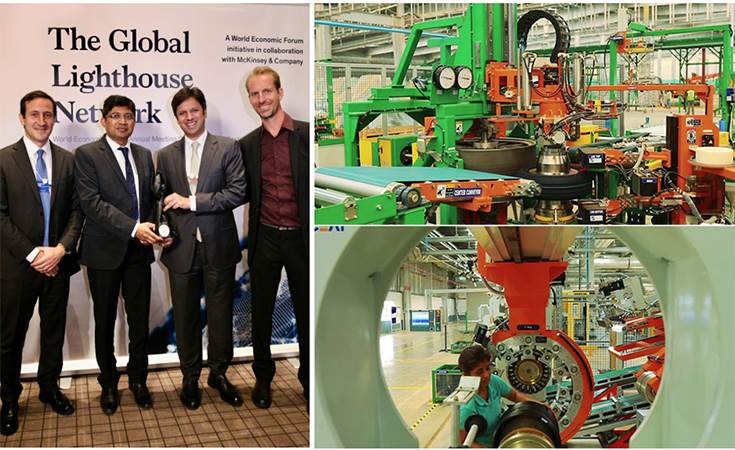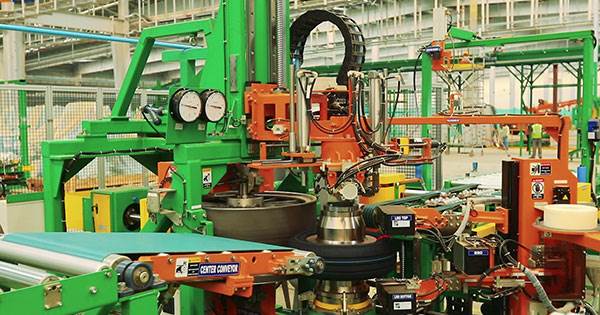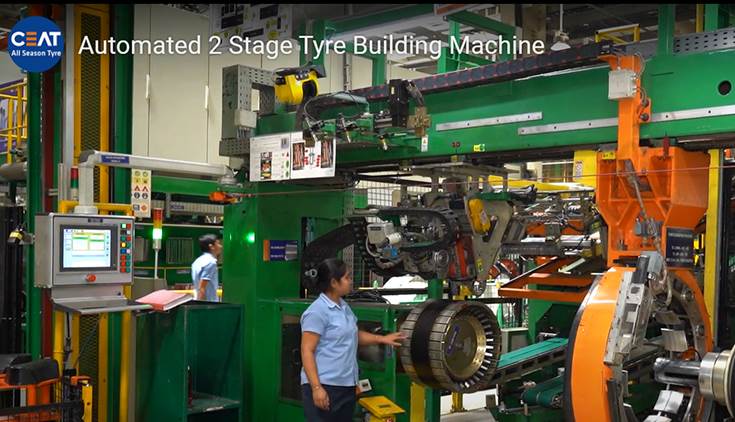Ceat, the flagship company of the Mumbai-headquartered Indian industrial enterprise RPG Group, is accelerating its push to deploy Industry 4.0 technologies at six of its tyre manufacturing plants located across India. The tyre maker, which dominates the Indian electric-two-wheeler tyre segment with a 40% market share, is eyeing the World Economic Forum’s Lighthouse Certification next month for its Chennai plant.
The Lighthouse Certification recognises companies for leadership in their commitment to implement advanced manufacturing technologies, digitisation, and artificial intelligence in their production processes.
In January 2023, Ceat became the only tyre maker in the world to receive WEF’s Lighthouse Certification, which evaluates implementation of cutting-edge manufacturing technologies, for its flagship Halol (Gujarat) factory, which began its digital transformation in 2021 in four key areas: data and technology platform; people and capability; use-case deployment and value delivery, and change management.
 On January 20, 2023, Ceat’s Halol tyre manufacturing facility was designated by the World Economic Forum as an ‘Advanced Fourth Industrial Revolution (4IR) Lighthouse’. L-R: Francisco Betti, WEF; Jayasankar Kurrupal, SVP Manufacturing, Ceat; Anant Goenka, MD and CEO, Ceat; and Enno de Boer, Senior Partner and Global lead of digital manufacturing, McKinsey
On January 20, 2023, Ceat’s Halol tyre manufacturing facility was designated by the World Economic Forum as an ‘Advanced Fourth Industrial Revolution (4IR) Lighthouse’. L-R: Francisco Betti, WEF; Jayasankar Kurrupal, SVP Manufacturing, Ceat; Anant Goenka, MD and CEO, Ceat; and Enno de Boer, Senior Partner and Global lead of digital manufacturing, McKinsey
WEF certification as a global growth driver
The company, which is also the only tyre maker outside of Japan to have received the coveted Deming Prize in November 2020, is confident to repeat its Halol performance at its passenger-car radial (PCR) and motorcycle radial tyre plant in Chennai. Ceat believes that the Lighthouse Certification, which makes it part of the Global Lighthouse Network (GLN), enables it to imbibe best practices from other GLN members, as well as helps strengthen its presence with global vehicle OEMs in both domestic and international markets.
“Being part of the 132-member-strong GLN gives us the opportunity to network with other global companies and learn from them. It also further improves our reputation as a progressive and agile organisation, helping us strengthen our presence with global OEMs in both domestic and international markets,” Jayasankar Kuruppal, Senior Vice-President, Manufacturing, Ceat, told Autocar Professional.
Kuruppal added that while Ceat started its smart factory journey more than a decade ago in 2012, the real transformation began in 2021, which could be considered as the starting point of its Lighthouse Certification milestone. “We conceived the idea of a digital factory in 2012, however, at that time the transformation was only limited to digital barcodes, and deployment of a manufacturing execution system or MES from the standpoints of traceability and mistake proofing on the shopfloor,” he said.
“Between 2012 and 2021, we scaled these digital initiatives across our manufacturing sites, and in early 2021, we switched to a mega digital transformation to improve our operational efficiency in all PQCDSM parameters, and to set a benchmark in the industry,” said Kuruppal.

Leveraging AI, machine learning
The deployment of advanced Industry 4.0 solutions has enabled Ceat to improve the cycle times in critical tyre manufacturing operations by around 20%, reduce process scrap by 45-50%, and lower energy consumption by 15-18 percent. The company says that these measures have augmented its domestic OEM and exports businesses in the last three years.
With growing SKUs and introducing a range of new products, the digitisation transformation has enabled Ceat to improve productivity as capacities grew with its increasing share of business with leading passenger vehicle OEMs in the country. “Such supplies call for adherence to very tight specifications, which we could easily achieve with the digital transformation,” pointed out Kuruppal.
“Since early 2021, we have developed several use cases that touch various aspects of manufacturing, right from material procurement, production-equipment maintenance, training, warehousing, and despatches,” he added.
Apart from developing a digital analytics model for inventory management, Ceat, to a greater extent, has deployed artificial intelligence (AI) and machine learning (ML) models, as well as virtual reality for training. “We have also deployed several IoT-based sensors for real-time decision making, along with various dashboards that have reduced the troubleshooting time in case of any abnormalities in the manufacturing process,” Kuruppal explained.
The company has also digitised all operator test points at its flagship Halol PCR and truck-and-bus radial (TBR) factory in Gujarat and made it go completely paperless at the shopfloor.

Driving digitalisation
Ceat, which has six factories – Bhandup, Nashik, Nagpur, Ambernath, Halol, and Chennai, says it is cross-deploying its digitalisation initiatives taken at Halol at three of its other key sites – Chennai, Nagpur, and Ambernath. On the other hand, it is being realistic and only deploying point solutions at its Bhandup and Nashik factories, which are on the verge of completing 70 years of operations.
While it has incurred capex in lower double-digits in crores of rupees in upgrading its facilities with the state-of-the-art digital back-end technologies, its operating expenditure remains in high single-digit crores, with projections of the investment continuing over the next two to three years as well. “We have charted a three-year digitisation roadmap, as well as shortlisted a few use cases to improve customer experience to a large extent,” concluded Kuruppal.
